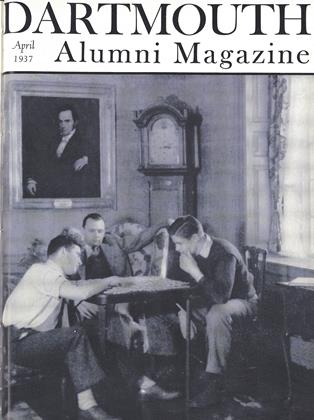The most conspicuous changes to a returning alumni would be the building developments. Chandler Hall is gone and its site is being graded, making a surprisingly attractive vista between Hitchcock, Crosby and Parkhurst. The new dining hall will be the biggest innovation, filling the gap between South Mass. and the Psi Upsilon house. Undergraduates living on the west side of campus have expressed the hope that the completion of the dining hall will result in the improvement of the road between Massachusetts Row and the Administration buildings.
Two new fraternity houses give an air of stability to that troubled situation, with the Phi Gamma Delta house almost completed, and the Gamma Delta Chi house under construction. This month word was released that the College will rebuild the business block just south of the Hanover Inn, making a two-story building of fireproof construction which will be in harmony with the other College architecture.
Fraternities at Dartmouth have held the spotlight since the Social Survey Committee report last spring brought them to the fore. When the immediate furore subsided, the houses settled down to a determination to show that they had a definite value to Dartmouth and to the individuals involved. Repeated assurances of cooperation from the Administration were borne out by the appointment of Davis Jackson '36 as fraternity adviser, and the selection of Dartmouth as a sort of experimental laboratory for the national fraternities with chapters in Hanover. The organization of an interfraternity treasurers' council did much to remedy certain internal frictions. Christmas parties, interfraternity plays, and valuable cooperation at the North Country Fair have contributed to making fraternities again a vital factor on campus. The fraternity situation, which perhaps more than any other reflects the spirit of the 1936-1937 year at Dartmouth, is more adequately described elsewhere in this issue. The only comment from this column might be that there is a little too much optimism, that many of the actions of the fraternities have been directed from the top, and do not reflect any significant change in undergraduate spirit within the houses themselves.
Informal student-faculty contacts would seem to be as valuable a part as ever in the Dartmouth education, and we would suggest that the trend has been toward making them easier and more frequent. The freshman feeds, organized by the Dartmouth Union and Green Key, started the yearling class with a definite outlook toward the human side of the faculty. Dormitory groups met on different nights for supper in one of the rooms adjoining Commons, with a professor to talk after the meal. The talks were built around the general subject "The faculty as human beings" or some associated topic, and dormitory friendships and a wide acquaintance were urged. The fifteen-minute Wednesday Forum meetings, where talks are given by members of the faculty, also encourage this less formal contact, as does almost any association made outside the classroom.
President Hopkins, after opening the year with a Convocation address directed primarily at the undergraduates, again appeared in an informal role at Dartmouth Night, talking to the College as a man rather than as the President. This contact was further heightened by talks to fraternity groups, giving a closer personal contact than has been possible in more formal addresses. He frankly explained the Administration's attitude toward the fraternity problem, stressing the need of accepting responsibility and urging that Dartmouth has no need of institutions whose only aim is self-perpetuation.
The student-faculty situation still has room for improvement. Such relationships, by their very nature call for small informal groups, and hence a certain amount of initiative on the part of the individuals concerned. In some respects the Canoe Club, with occasional student-professor feeds, accomplishes a great deal. The Outing Club could do a great deal more to bring undergraduates and faculty together on an equal footing. Other clubs and organizations on campus could do more than they do at present.
 View Full Issue
View Full Issue
More From This Issue
-
 Sports
SportsDeaths
April 1937 -
 Article
ArticleFootball From the Inside Out
April 1937 By DAVID M. CAMERER '37 -
 Sports
SportsFollowing the Big Green Teams
April 1937 By ROBERT P. FULLER '37 -
 Class Notes
Class NotesClass of 1902
April 1937 By Hermon W. Farwell -
 Class Notes
Class NotesClass of 1927
April 1937 By Doane Arnold -
 Article
ArticleGradus Ad Parnassum
April 1937
William B. Rotch ’37
-
 Letters to the Editor
Letters to the EditorLetters
Mar/Apr 2006 -
 Article
ArticleThe Undergraduate Chair
March 1931 By William B. Rotch ’37 -
 Article
ArticleCARNIVAL ORDERLY AFFAIR
March 1931 By William B. Rotch ’37 -
 Class Notes
Class Notes1937
SEPTEMBER 1999 By William B. Rotch ’37 -
 Class Notes
Class Notes1937
NOVEMBER 1963 By William B. Rotch ’37, FRANKLIN E. ROBIN -
 Class Notes
Class Notes1937
FEBRUARY 1965 By William B. Rotch ’37, FRANKLIN E. ROBIN







